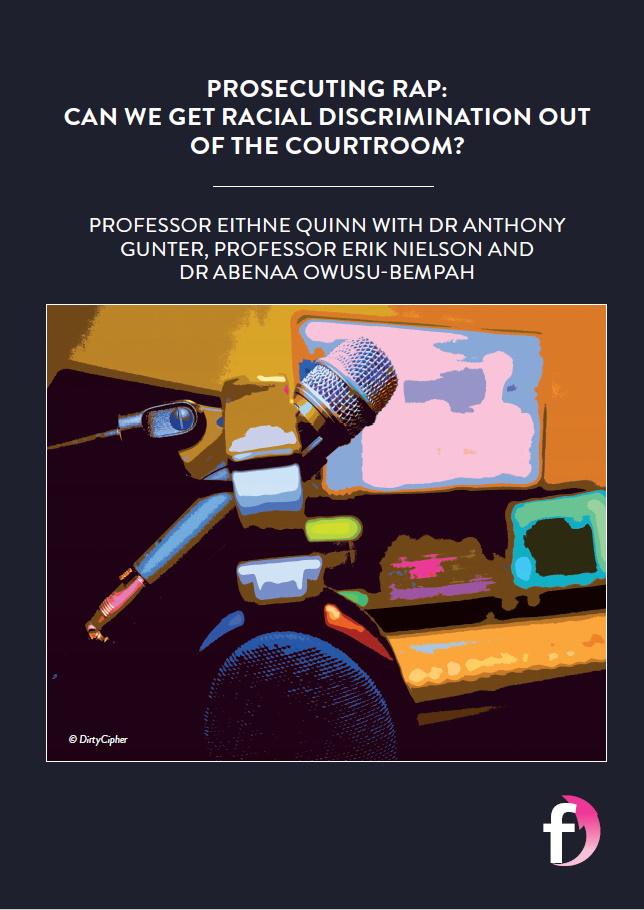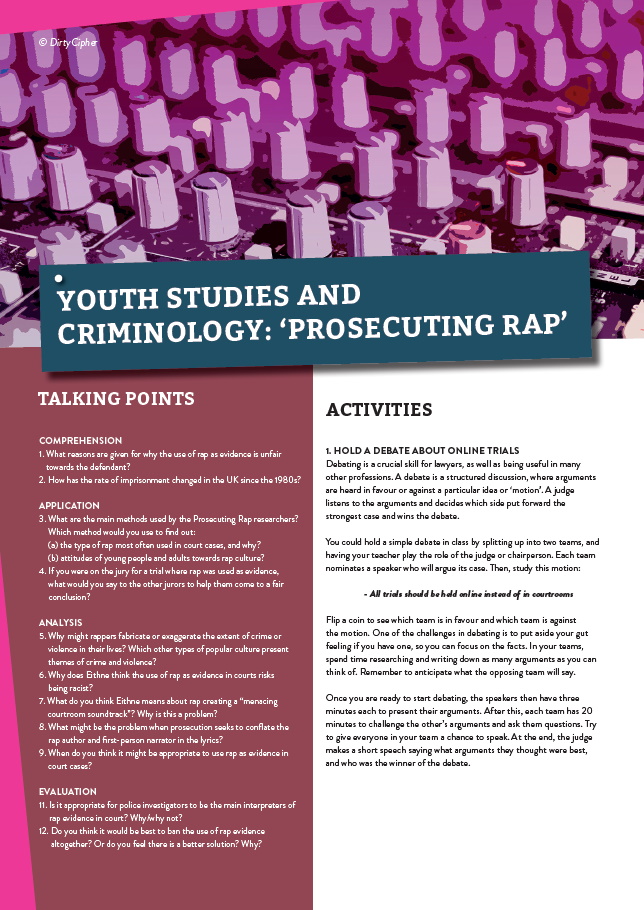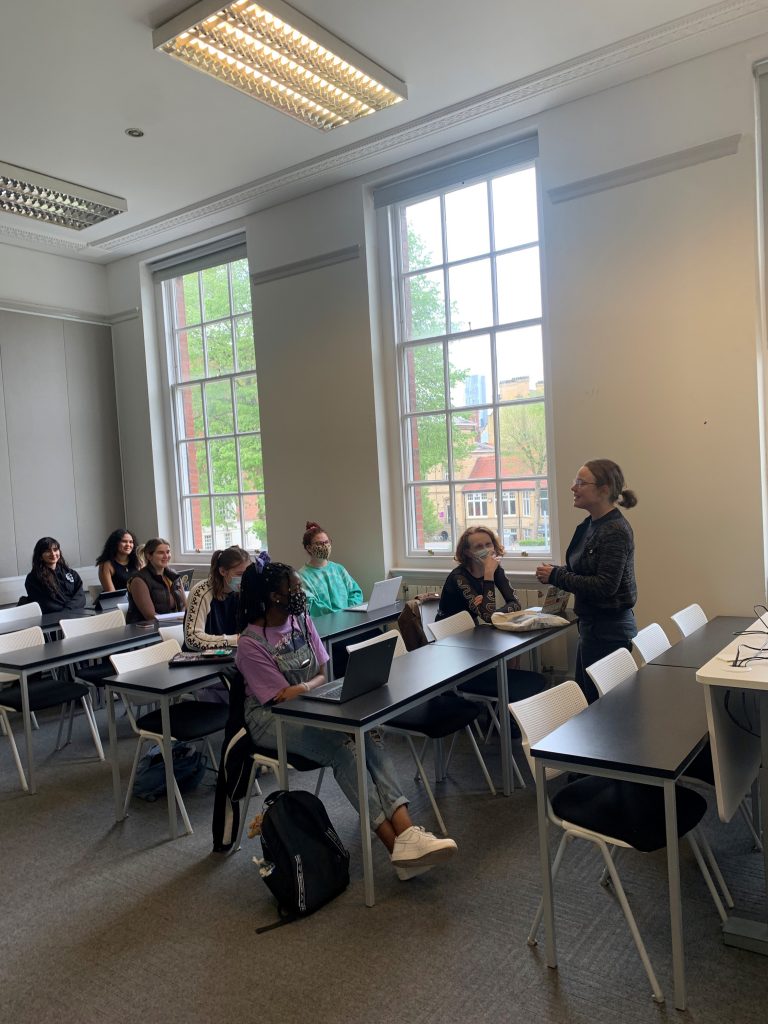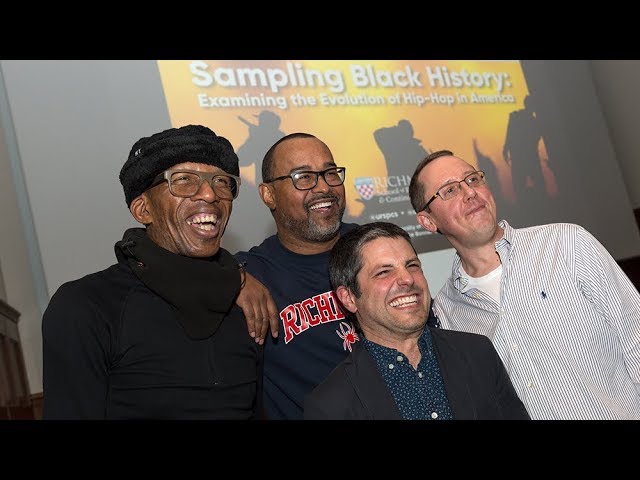Prosecuting rap: can we get racial discrimination out of the courtroom?
When young Black men and boys are accused of crimes, rap music is often presented as evidence. This is a practice that an international network of scholars, including Professor Eithne Quinn from the University of Manchester in the UK, has found to be structurally racist
GLOSSARY
PROSECUTE – to charge someone of a crime and present evidence against them in court
DEFENCE – (in court) the argument that the accused person should not be found guilty
DEFENDANT – the accused person in a court of law
FAIR TRIAL – a trial that is conducted justly and in which the defendant is afforded their full rights
STRUCTURAL RACISM – rules or systems in a society that result in unequal treatment of people depending on their race
DISCRIMINATION – treating a person unfairly because of who they are, including in relation to race
RAP ARTISTRY – rap skill, quality, craft or creativity
PERSONA – a character or role that someone takes on, not the same as and often confused with their true personality
FIRST PERSON – narrative voice using the pronoun ‘I’
BADMAN – an ultra-masculine, often violent persona
CRIMINOLOGY – the study of crime, criminals and criminal justice
CAMARADERIE – a sense of togetherness and friendship
Think about the music you listen to, the videos you watch or the games you play. Do they include references to bad behaviour? It might be that there are some lyrics or scenes that you would not be comfortable sharing with your parents because they involve violence, drugs or theft, for example.
Now, imagine the police found you had written stories or lyrics about these themes and they used them to help to suggest that you are a criminal. This might sound unfair, but it is a reality some people face in the UK. In dozens of court cases, rap music videos or lyrics are used as evidence that a young person broke the law. Rap music is predominantly a Black youth form of artistry and, consequently, most of the defendants in such cases are young Black people. Eithne Quinn, a professor of cultural studies at the University of Manchester, is an expert on race, justice and culture, and she has shed light on this problem through her research project, “Prosecuting Rap: Criminal Justice and UK Black Youth Expressive Culture”.
HOW DOES RAP END UP IN A COURTROOM?
Making music is hardly a crime, so you might find it surprising that rap can find its way into a court of law. However, this is happening, and more frequently so, during trials involving serious crimes such as assault, robbery or murder. Police investigators help the prosecution by looking for evidence against suspects, which can include trawling the internet and searching mobile phones for things they have written or videos they have made or appeared in.
When the investigators come across rap music lyrics or videos, they sometimes find references to violence and submit this as evidence that the suspect is a violent person. Rap music lyrics are usually written in the first person, so it might sound like the rapper is talking about things that they have done or want to do. For example, lyrics that say “I’m going to shoot you” could be used to suggest that the rapper was planning a murder in real life.
Unfortunately, this logic is flawed. As you will know from books you have read, just because an author uses the first person does not mean that they are writing an autobiography! Furthermore, despite the fact that crime and violence are common themes in other types of pop-culture (such as action films and video games), only rap is regularly used as criminal evidence. This concerns Eithne because she believes it “unduly targets the expressive forms of young Black people”.
IS RAP REALLY ABOUT VIOLENCE?
For many young people, rap is the music of rebellion and partying, and the lyrics can address themes of racism, inequality and alienation. Many young people face discrimination and a lack of opportunities, a situation that is all too common in one of Europe’s least equal societies.
Rap does have some autobiographical elements and it often insists rhetorically on ‘keeping it real.’ But it would be a mistake to assume that rap lyrics are true stories. The truth is that rap – the most streamed type of pop music in the world – is big business, and part of its success lies in sticking to a familiar formula. This formula includes the image of authenticity, but also standard phrases about crime and violence which are tweaked, reused and exaggerated over time. Eithne describes the result as “a highly performative type of music that expresses emotions, entertains, and hopefully makes artists some money”, which “should certainly not simply be taken as a personal testimony”.
WHAT HAPPENS WHEN RAP IS USED AS EVIDENCE?
Unfortunately, the nuances of rap music culture are not obvious to UK jurors (who are mostly white and have an average age of about 50). Eithne explains, “When rap music videos are played in courtrooms in the midst of evidence about a violent incident, a literal reading of the lyrics can become compelling”. Instead of hearing fictional tales and repeated refrains, the jury members can too easily believe they are listening to confessions of guilt.
There are some cases where a rap song does have relevance to a crime. For instance, when a rap video that includes an insult about someone could incite retaliatory violence. But, even then, the danger is that playing the music in court, in the context of evidence about a violent incident, makes the connection between violent lyric and actual violence seem much stronger than it is.
Many lawyers worry that this type of evidence has ‘prejudicial value’, as it plays to the emotions of the jury in ways that unduly damage the defendant’s case. Some types of rap music, such as drill, can be intimidating to the jurors if they have not heard it before.
Reference
https://doi.org/10.33424/FUTURUM273
PROSECUTE – to charge someone of a crime and present evidence against them in court
DEFENCE – (in court) the argument that the accused person should not be found guilty
DEFENDANT – the accused person in a court of law
FAIR TRIAL – a trial that is conducted justly and in which the defendant is afforded their full rights
STRUCTURAL RACISM – rules or systems in a society that result in unequal treatment of people depending on their race
DISCRIMINATION – treating a person unfairly because of who they are, including in relation to race
RAP ARTISTRY – rap skill, quality, craft or creativity
PERSONA – a character or role that someone takes on, not the same as and often confused with their true personality
FIRST PERSON – narrative voice using the pronoun ‘I’
BADMAN – an ultra-masculine, often violent persona
CRIMINOLOGY – the study of crime, criminals and criminal justice
CAMARADERIE – a sense of togetherness and friendship
Think about the music you listen to, the videos you watch or the games you play. Do they include references to bad behaviour? It might be that there are some lyrics or scenes that you would not be comfortable sharing with your parents because they involve violence, drugs or theft, for example.
Now, imagine the police found you had written stories or lyrics about these themes and they used them to help to suggest that you are a criminal. This might sound unfair, but it is a reality some people face in the UK. In dozens of court cases, rap music videos or lyrics are used as evidence that a young person broke the law. Rap music is predominantly a Black youth form of artistry and, consequently, most of the defendants in such cases are young Black people. Eithne Quinn, a professor of cultural studies at the University of Manchester, is an expert on race, justice and culture, and she has shed light on this problem through her research project, “Prosecuting Rap: Criminal Justice and UK Black Youth Expressive Culture”.
HOW DOES RAP END UP IN A COURTROOM?
Making music is hardly a crime, so you might find it surprising that rap can find its way into a court of law. However, this is happening, and more frequently so, during trials involving serious crimes such as assault, robbery or murder. Police investigators help the prosecution by looking for evidence against suspects, which can include trawling the internet and searching mobile phones for things they have written or videos they have made or appeared in.
When the investigators come across rap music lyrics or videos, they sometimes find references to violence and submit this as evidence that the suspect is a violent person. Rap music lyrics are usually written in the first person, so it might sound like the rapper is talking about things that they have done or want to do. For example, lyrics that say “I’m going to shoot you” could be used to suggest that the rapper was planning a murder in real life.
Unfortunately, this logic is flawed. As you will know from books you have read, just because an author uses the first person does not mean that they are writing an autobiography! Furthermore, despite the fact that crime and violence are common themes in other types of pop-culture (such as action films and video games), only rap is regularly used as criminal evidence. This concerns Eithne because she believes it “unduly targets the expressive forms of young Black people”.
IS RAP REALLY ABOUT VIOLENCE?
For many young people, rap is the music of rebellion and partying, and the lyrics can address themes of racism, inequality and alienation. Many young people face discrimination and a lack of opportunities, a situation that is all too common in one of Europe’s least equal societies.
Rap does have some autobiographical elements and it often insists rhetorically on ‘keeping it real.’ But it would be a mistake to assume that rap lyrics are true stories. The truth is that rap – the most streamed type of pop music in the world – is big business, and part of its success lies in sticking to a familiar formula. This formula includes the image of authenticity, but also standard phrases about crime and violence which are tweaked, reused and exaggerated over time. Eithne describes the result as “a highly performative type of music that expresses emotions, entertains, and hopefully makes artists some money”, which “should certainly not simply be taken as a personal testimony”.
WHAT HAPPENS WHEN RAP IS USED AS EVIDENCE?
Unfortunately, the nuances of rap music culture are not obvious to UK jurors (who are mostly white and have an average age of about 50). Eithne explains, “When rap music videos are played in courtrooms in the midst of evidence about a violent incident, a literal reading of the lyrics can become compelling”. Instead of hearing fictional tales and repeated refrains, the jury members can too easily believe they are listening to confessions of guilt.
There are some cases where a rap song does have relevance to a crime. For instance, when a rap video that includes an insult about someone could incite retaliatory violence. But, even then, the danger is that playing the music in court, in the context of evidence about a violent incident, makes the connection between violent lyric and actual violence seem much stronger than it is.
Many lawyers worry that this type of evidence has ‘prejudicial value’, as it plays to the emotions of the jury in ways that unduly damage the defendant’s case. Some types of rap music, such as drill, can be intimidating to the jurors if they have not heard it before.
Stereotyping plays a big part. Whether or not the jurors are aware of it, they are being encouraged to associate Black culture with criminality – something that Eithne believes should be completely “shut down” in court. It does not help that the evidence is often presented by a police officer who is introduced as an ‘expert’ on rap material. This means that if the defendant gives a different interpretation of the rap music lyrics, it is, in many cases, their word against that of the police.
Eithne believes that the loose way rap is used in cases with multiple defendants, to cast a tone on proceedings against all the defendants, is structurally racist. “The use of rap music as evidence in court against groups of defendants is particularly dehumanising. It leads to some really murky thinking in cases that have life-changing consequences for the defendants,” she says.
HOW CAN WE CHALLENGE THE USE OF RAP IN COURT?
Eithne has collaborated with a number of colleagues including sociologist Dr Anthony Gunter, African American culture expert Professor Erik Nielson and law scholar Dr Abenaa Owusu-Bempah, to tackle the issue of the unfair use of rap music as evidence in court. They believe the first step is to ensure the defence closely scrutinises and challenges the rap music evidence when the prosecution tries to use it. The network is raising awareness about this troubling phenomenon and is building the capacity of independent experts who can explain the context of rap music lyrics properly to judges and juries in court cases. The network hopes that if academics and lawyers keep working together, they can vastly reduce the amount of music material getting as far as the jury.
The network’s ultimate goal is to see structural changes. Eithne and her colleagues would like to see changes in the case law and in the guidance from the Crown Prosecution Service to make it much harder to present rap as evidence. The network hopes that these changes will make the courtroom a fairer place for everyone.
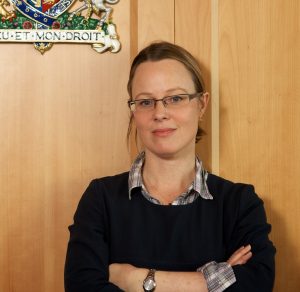 EITHNE QUINN
EITHNE QUINN
Professor of Cultural Studies, University of Manchester, UK
FIELDS OF RESEARCH: American Studies, Criminology, Cultural Studies
RESEARCH PROJECT: Investigating the use of rap music lyrics and videos as evidence for the prosecution in criminal trials
FUNDER: Arts & Humanities Research Council (AHRC)
Professor Quinn was a leadership fellow of the Arts & Humanities Research Council (2020-21). This project was funded by an Arts and Humanities Research Council Leadership Fellowship, Prosecuting Rap: Criminal Justice and UK Black Youth Expressive Culture [AH/T000058/1].
 EITHNE QUINN
EITHNE QUINN
Professor of Cultural Studies, University of Manchester, UK
FIELDS OF RESEARCH: American Studies, Criminology, Cultural Studies
RESEARCH PROJECT: Investigating the use of rap music lyrics and videos as evidence for the prosecution in criminal trials
FUNDER: Arts & Humanities Research Council (AHRC)
Professor Quinn was a leadership fellow of the Arts & Humanities Research Council (2020-21). This project was funded by an Arts and Humanities Research Council Leadership Fellowship, Prosecuting Rap: Criminal Justice and UK Black Youth Expressive Culture [AH/T000058/1].
MEET THE ‘PROSECUTING RAP’ NETWORK
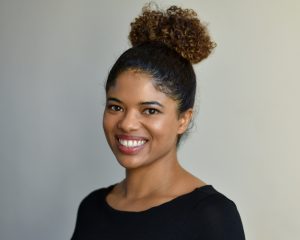
DR ABENAA OWUSU-BEMPAH
Associate Professor of Law, The London School of Economics and Political Science, UK
Field of research: Criminal Law and Criminal Evidence
I am a legal academic with an interest in criminal law, but I have also been a fan of rap music for most of my life. When I learnt that rap music is used as evidence in court, I was interested to find out how and why. My expertise in law allows me to assess whether admitting ‘rap evidence’ is consistent with the rules of evidence and principles of fairness in a criminal trial.
Analysing court cases is interesting and intellectually challenging! I search online databases for cases where rap music was used as evidence, then analyse the facts and the legal arguments, taking notes and identifying patterns as I go. My analysis shows that, in England and Wales, rap music lyrics are often treated as ‘bad character evidence’ in serious cases involving weapons or violence.
My biggest concern is that racial prejudice could result in wrongful convictions. Rap music is primarily used as evidence against young Black people in a way that feeds into racist stereotypes that associate them with crime. We don’t see juries being given other violent genres of music as evidence.
Rap music should not be used as evidence if it is not relevant to the case! A key factor is how specific the lyrics are – do they include factual information about the crime? Before allowing prosecutors to use rap as evidence, courts should also consider the prejudicial effect – is the jury likely to think rap is stronger evidence than it is? Although change is slow, our work is raising awareness and changing perceptions. Hopefully, we’ll soon see rap music evidence appearing much less often.
One important issue facing the next generation of legal researchers will be the impact of technology, potentially including virtual trials. Conducting court proceedings online can be more efficient than in-person, but it can also lead to victims, witnesses and defendants feeling excluded or unable to engage properly.
HOW DID ABENAA BECOME A LAW PROFESSOR?
When I was younger, I had a range of interests from music (I played the trumpet for a while) to art and sports. I’m not sure that I had a keen sense of justice, but I would get upset when I felt someone had been mistreated by the authorities.
From the age of 15 or 16, I wanted to become a criminal defence lawyer. I think I was inspired by the knowledge that innocent people get convicted, and that the criminal justice system can be harsh and unfair. I also watched a lot of legal dramas on TV.
Mostly, I work independently and have control over my research agenda, which is great, but it requires a lot of focus, self-discipline and perseverance.
My proudest achievement is completing my PhD. It was a long and intense process, but it gave me the confidence to become a researcher. As for the future, I would like to continue working to improve outcomes for the most vulnerable people in the justice system.
• Law has many different areas (such as criminal, corporate, family, IT or human rights) so it is helpful to take a range of subjects.
• English, history and philosophy can help prepare you well for a law degree.
• To find out more, look for work experience, volunteer at a law centre, or go to watch a trial and see the law in action.
• Keep in mind that studying law does not mean that you have to become a lawyer! Many law graduates go on to work in other sectors, including business and finance, politics and international development.
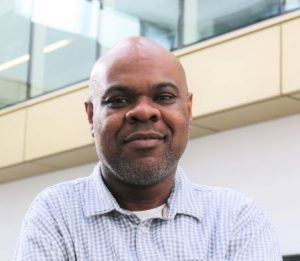
DR ANTHONY GUNTER
Senior Lecturer (Associate Professor) in Childhood and Youth Studies, The Open University, UK
Fields of research: Youth Studies, Criminology and Criminal Justice
I am interested in using research to understand real-world social issues. I draw on my experiences as a youth and community practitioner to engage with young people ‘on Road’ (on streets) or in youth clubs, residential activity centres, schools, colleges and Youth Offending Institutes. I write fieldwork diaries based on my observations, and I also record semi-structured interviews where I ask about a certain theme, but the participant can also speak freely.
My findings indicate that urban youth culture – including rap – plays a largely positive role in young people’s lives. It provides camaraderie, entertainment and a strong sense of identity. The ‘street gang’ label is used to criminalise large numbers of innocent young Black males. In reality, these ‘gangs’ are just neighbourhood friendship groups. There is no academic agreement on the existence of gangs, or whether gangs cause crime.
Instead of criminalising street gangs, government policies should support young people through employment, education and training opportunities, but, in recent years, youth support services have seen their funding cut.
Through my research, I hear from young people and their families about their lived experiences – from voices who are pushed to the margins and largely ignored by mainstream society. There is also international travel; I have undertaken research in Jamaica and the US and presented my findings to conferences in Sweden and Japan, for example.
HOW DID ANTHONY BECOME A YOUTH STUDIES RESEARCHER?
Growing up, I was a massive hip-hop fan, and also very interested in politics and Black popular culture, so I suppose it is no coincidence I am doing what I am doing now!
I was a ‘disaffected’ young man who hated school and, in fact, left school with only one equivalent GCSE in English. I went to college and studied GCSE sociology where I learned that kids like me were set up to fail. This was a eureka moment where I became committed to working (as a street-based youth worker) with so-called disaffected young people like myself.
When I became a youth worker, I became concerned about the negative portrayal of Black British youth in the media. I wanted to demonstrate that Black youth were not essentially criminal, bad or less intelligent than young white people. So, I embarked on a PhD to prove just that… and here I am now.
Perseverance, curiosity, an interest in people’s lives, wanting to help others to help themselves, and a passion for social justice have got me to where I am today. My career highlights have been working with communities to establish much needed services, and my first published book which was based on my PhD topic.
PATHWAYS TO YOUTH STUDIES AND CRIMINOLOGY
• At school or college, study social science or humanities subjects (such as law, sociology, politics, anthropology, history or human geography).
• At university, degrees are available in criminology, childhood and youth studies, and youth work. Learn more here.
However, university does not have to be your first step. Anthony recommends you engage in your local community: “I started off as a volunteer at my local youth and community centre, and it literally changed my life.”
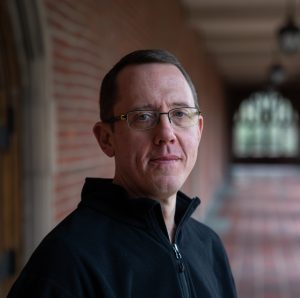
PROFESSOR ERIK NIELSON
Professor of Liberal Arts, University of Richmond, USA
Field of research: Literature (African American literary and musical traditions)
My research explores the relationship between Black culture and the law in the US. As part of this research, I stumbled onto a disturbing phenomenon: prosecutors were using rap music lyrics as evidence in criminal cases, effectively punishing young men (almost exclusively young men of colour) for their art. The more I investigated this, the more I realised that it wasn’t an isolated practice — it was, and still is, pervasive.
It’s very common for rap lyrics to be used in American courts. Our research has identified several hundred cases, although we know there are many more if we include investigations, indictments, sentencing hearing, and plea deals, as well as trials. Until we know the full scale of ‘rap on trial’, it’s difficult to estimate its impact on conviction rates. However, we have found that when rap lyrics are used, even when other evidence may be lacking, defendants are very likely to be convicted.
In pre-trial reports or in-court testimonies, I explain the history of rap music as an art form. Drawing on my academic training, which includes degrees focused on English Renaissance literature, as well as African American literature, I inform courts of the complex musical and poetic conventions that underpin rap music. Reading rap music lyrics literally is no less foolish than reading other fictional genres that way.
At this point, I have worked on nearly 100 cases. As an expert witness in court, I see that prosecutors rely on the unstated assumption that the young Black and Latino defendants aren’t capable of producing sophisticated art. This perpetuates stereotypes about young men of colour – stereotypes that are behind their mistreatment in the criminal justice system more broadly.
I see young men punished for their creativity, and I think about my own sons. As white children, they are unlikely to be in that position. This issue reveals one of the many double standards that have come to define our broken legal system.
It is an uphill battle, but interest in our research is growing. In New York, for example, two state senators have introduced legislation intended to limit the use of rap music as evidence. That’s one state out of fifty, so there’s plenty more to do on that front.
Growing up, I was interested in music and sports, and little else! My success has come, in part, by not always following the conventions of academia. For example, rather than focus all my energy on publishing in scholarly journals, I have tried to write in places that are more publicly accessible. That has led to more real-world impact.
• Alongside literature, a range of courses could help you to explore different ideas. Erik explains, “Some of the music and sociology courses I took as an undergraduate influenced me to take my career in this direction.”
• American Studies is a cross-disciplinary field – like French Studies or Chinese Studies, it is known as an ‘area study’ and it includes a mix of culture, history, politics and literature.
• To get into an American studies degree programme, choose subjects like sociology, media studies, politics, history and English literature.
• Read, watch and listen! US popular culture, media and politics have a huge influence on global culture.
• For opportunities in the UK, check the UK-US Fulbright Commission (@USUKFulbright), the US Embassy in London (@USAinUK) and US Studies Online (@BAASUSSO) on twitter.

PROFESSOR EITHNE QUINN
Professor of Cultural Studies, University of Manchester, UK
Field of research: American Studies, Criminology, Cultural Studies
As the author of a scholarly book on ‘gangsta rap’ music, I started being approached by lawyers who needed expert advice at short notice. A lot of the work is writing reports about the rap lyrics and videos that the prosecution wants to use as evidence in the courtroom. This forces you to write in a clear and straightforward way (a good exercise for academics, who are notorious for writing long and convoluted sentences!).
I have given evidence in our criminal courts including at the Old Bailey (Central Criminal Court) in London. Given the chance, I’ve found jurors are often open to hearing a more complex account of rap music evidence. For instance, a rap music line that sounds, on the face of it, like a specific cold-blooded threat, can turn out to be simply lifted from the verse of a famous rapper that the defendant admires. Evidence that seems relevant to the case and damaging to the defendant can suddenly be exposed as irrelevant and simply part of a creative practice.
However, I have also seen jurors shocked by violent themes when rap videos are played to them in courtrooms. Videos often feature groups of young men making violent boasts and looking hostile. That’s the drill formula! It is very open to misreading and can easily become a menacing courtroom soundtrack.
I believe that far too many young people of all colours are being locked up in the UK. Our prison population has expanded massively since the 1980s. We often voice concern about ‘mass incarceration’ in America, but we need to turn our gaze to look at what’s going on here in our own criminal justice system. Many children grow up in poverty, even though we are one of the richest countries in the world. We should be investing in our children rather than using their art to criminalise them.
Like most kids, I loved music growing up. I liked house music and rap. I did American Studies for my first degree at the University of Manchester (the same department where I am now a professor). During my third year as an undergraduate, I wrote my first ever essay on rap music. I didn’t do terribly well on it, but I enjoyed researching and writing it.
Why did I focus on American studies? The truth is, I fancied a year of study in the US! If you do American Studies, you can get to study in America – I went to Washington DC and it was a really important and formative experience in my life.
After I published my book on rap music, which was based on my PhD thesis, I was asked by defence solicitors to explain the music genre in court cases. At first, I questioned whether I had the relevant expertise or could communicate it in the right way. Stepping into a different professional arena with high stakes was scary.
I’m naturally an introvert, so I’ve had to find my voice to speak in court. I really like to make connections between different areas of study. Although I’m based in American studies, I’ve also worked in cultural studies and film studies, and I now have strong interests in criminology and socio-legal studies.
Aside from the ‘Prosecuting Rap’ project, my proudest achievements have been in teaching. I love to see students engaging and developing their own ideas. As lecturers, we can learn a great deal from students.
EITHNE’S TOP TIPS
• Follow your nose. Choose options that you enjoy, feel strongly about and are likely to perform well at. Move beyond the classroom and pursue your interests.
• Sometimes, it’s the things that stretch us that turn out to be the most valuable. Once I started serving as an expert in court cases, I learnt so much and so quickly. I felt I could make an impact in an area I felt strongly about.
Write it in the comments box below and Eithne, Abenaa, Anthony or Erik will get back to you. (Remember, researchers are very busy people, so you may have to wait a few days.)

